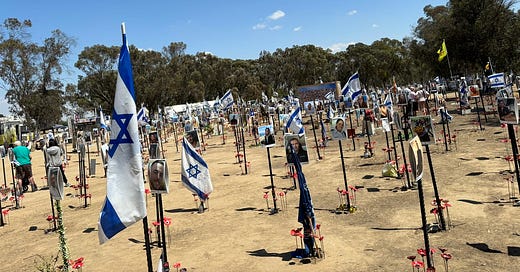365 days. 101 hostages still held in Gaza. The masking tape on the shirts of hostage families, reflecting how many days this conflict continues, serves as a painful hourglass of the last year and an angry reminder of the heinous actions of Hamas on October 7. Concomitantly, Jews in America over the last twelve months have experienced spasms of violence, intimidation, and outright hatred unseen in decades. The campus protests following the massacre epitomized dark forces of antisemitism at home and abroad that left American Jews feeling marginalized and unprotected. Meanwhile, Israel became a deeply polarizing issue across the political spectrum.
Amidst this unequivocally horrible year, a few bright spots emerged that provide the basis for humble optimism moving forward. First, notwithstanding countless stories to the contrary, support for Israel’s defense remained rock solid in both parties. Bipartisan congressional leaders stood behind Israel, advocated for the hostages, and pressed foreign leaders, whether Senator Schumer’s trip to Israel on October 15 or Senator Ernst’s frequent visits to the region.
As a foreign policy professional and former Democratic staffer, the last twelve months were professionally trying and personally distressing. While President Biden offered extraordinary support for Israel over the last twelve months, some activists, with whom Jews had largely stood shoulder to shoulder during civil unrest in 2020, tried to drive the party to a place with which the Jewish community found, for the most part, profoundly unsettling. When those protests turned antisemitic or destructive, many universities failed to call them out, stop them, or recognize the maddening double standard at play.
Yet the center held. As the campuses raged, the heart of the Democratic Party remained centrist on foreign policy, including support for Israel and, most important, support for the U.S. hostage families. Vice President Harris repeatedly affirmed both Israel’s right to defend itself and the U.S. commitment to ensure Israel has the ability to do so, and she spoke unwaveringly about the brutality that unfolded on October 7, especially the sexual violence that Hamas perpetrated. Meanwhile, Democratic primary voters dispatched two “Squad” members particularly hostile to Israel and welcomed Jon Polin and Rachel Goldberg-Polin at the Democratic National Convention (just as the Republican National Convention hosted the Neutra family).
Frustratingly, stories on Biden’s Middle East approach oscillated between criticizing Biden for failing to restrain Israel (see Nicholas Kristof’s piece here) or wrongly trying to restrain Israel (see Bret Stephens here). In truth, President Biden had minimal leverage over Hamas or Hezbollah yet managed to stave off a war between Israel and Lebanon for close to a year. Further, Israel would not be able to achieve its remarkable tactical military gains in Lebanon, Gaza, or elsewhere without the deterrent effect of U.S. power, including an aircraft carrier in the Mediterranean; a squadron of F-35s deployed to the region; a submarine overtly patrolling near Lebanon; and continued strikes on Iranian proxies.
Strong bipartisan majorities in Congress also put aside their differences earlier this year to ensure continued military aid to Israel, including replenishing the Iron Dome and David’s Sling missile defense systems which were vital in warding off Iranian missile attacks.
October 7 gave rise to unexpected bipartisan coalitions of D.C. experts and legislators who lent their knowledge to help U.S. hostage families and victims of the conflict navigate Washington. I participated in several of these groups, and was deeply heartened by the concern and creativity shown by former legislative staff, communications experts, and foreign policy leaders who worked tirelessly to ensure the issue of kidnapped Americans remained front and center. Likewise, in Israel and at home, I witnessed countless Members of Congress giving their personal phone numbers to the parents of hostages, and they stood ready to help in whatever way possible.
We now stand at an inflection point, where developments in Gaza risk getting lost amidst successes in Lebanon and potential war in Iran. Until this point, the U.S. hostage families relied on D.C. experts for help publicizing their cause. We now need them to inspire us, give us strength, and ensure that those suffering in Gaza are not forgotten.
I visited the Nova music festival site in May. The site, like the surrounding kibbutzim, is a random collection of photos and memorials, like a disorganized cemetery before order is brought by a caretaker or historian. No formal markers or museums yet, just an empty field and forest marked by rows upon rows of impromptu memorials. This will change in time, but the visceral nature of these sites will remind people of what happened on that day and the suffering unleashed as a result.
Daniel Silverberg is a Senior Adjunct Fellow at the Center for a New American Security.






Chuck Schumer supports Israel because he visited a year ago? Chuck Schumer in July 2024: "Schumer points to ‘serious disagreements’ as reason for not shaking Netanyahu’s hand"
Kamala supports Israel? Kamala skips Netanyahu's speech, instead she was in Indianapolis at that time to speak at the Zeta Phi Beta Soriority Inc. national convention.
Biden supports Israel.? Biden Blames Bibi After Hostages Are Murdered by Hamas. Says Neganyahu needs to do more (not terrorists have to do more?)
Public outrage for Israili reaction for kidnaping and the inevitable Gaza civilian casualties only incourages militaries to engage in future kidnapings and to hide behind civilians. Is this what you want?
Even the most brutal wars, like the German-Russian front in WWII, did not engage in said activity on a large scale. Why not? Because they knew such actions would not inhibit the enemy.
Do you think the members of Western Civilization would resort to kidnaping and using civilian shields?